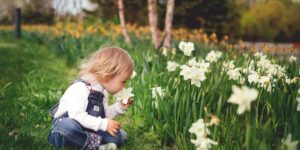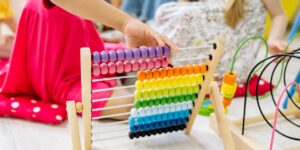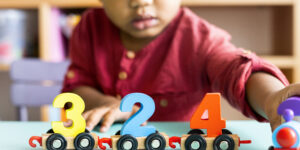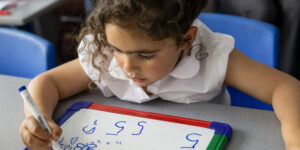asleep awake. your child will learn how to change roles and use different rules for those roles. approaches to learning. level 4: 3 - 4 years. 15m. bathtime fun. your child will learn exploring the characteristics of water. science. level 2: 9 - 18 months. 15m. big and small world. your child will learn using size vocabulary words to compare two different objects. math. level 3: 19 - 36 months. 15m. comparing dominos. your child will learn comparing which group of 0-5 items has more, less or the same. math. level 4: 3 - 4 years. 15m. counting mix up. your child will learn counting up to 10 with one-to-one correspondence, even when the items being counted look different. math. level 5: 4 - 5 years. 15m. does it float? your child will learn the scientific process: making a hypothesis, experimenting, and determining results. science. level 4: 3 - 4 years. 15m. filtered (39) filters clear filters ×. community ×. counting cardinality ×. data measurement ×. executive function ×. geometry, spatial awareness shapes ×. logic and reasoning ×. physical science ×. relationships and interactions ×. scientific concepts ×. 15m ×. approaches to learning(4). math(21). science(10). social studies(1). social-emotional learning(3). wellness(1). sense of time (history)(1). community(1). life science(2). earth science(1). safe and healthy behaviors(4). scientific concepts(5). perceptual and sensorimotor(3). sounds of language(5). operations and algebraic thinking(8). sense of place (geography)(1). physical science(5). relationships and interactions(3). self and society(6). feelings and emotions(3). emergent writing(6). nutrition(3). exploration of creative arts(6). executive function(4). fine motor(7). geometry, spatial awareness shapes(10). gross motor(12). creative expression(6). counting cardinality(11). communication(4). self care wellness(8). emergent reading(8). 10m(49). 15m(39). 1hr(5). 20m(11). 30m(9). 45m(1). 5m(10). varies(12). level 1: 0 - 9 months(3). level 2: 9 - 18 months(6). level 4: 3 - 4 years(9). level 3: 19 - 36 months(8). level 5: 4 - 5 years(13). creativity and movement(2). learning for the whole family(3). learning in the community(7). learning throughout the day(16). other(3). science and inquiry(8). searchsearch× (39) cancel clear filters ×. community ×. counting cardinality ×. data measurement ×. executive function ×. geometry, spatial awareness shapes ×. logic and reasoning ×. physical science ×. relationships and interactions ×. scientific concepts ×. 15m ×. asleep awake. your child will learn how to change roles and use different rules for those roles. approaches to learning. level 4: 3 - 4 years. 15m. bathtime fun. your child will learn exploring the characteristics of water. science. level 2: 9 - 18 months. 15m. big and small world. your child will learn using size vocabulary words to compare two different objects. math. level 3: 19 - 36 months. 15m. comparing dominos. your child will learn comparing which group of 0-5 items has more, less or the same. math. level 4: 3 - 4 years. 15m. counting mix up. your child will learn counting up to 10 with one-to-one correspondence, even when the items being counted look different. math. level 5: 4 - 5 years. 15m. does it float? your child will learn the scientific process: making a hypothesis, experimenting, and determining results. science. level 4: 3 - 4 years. 15m.







